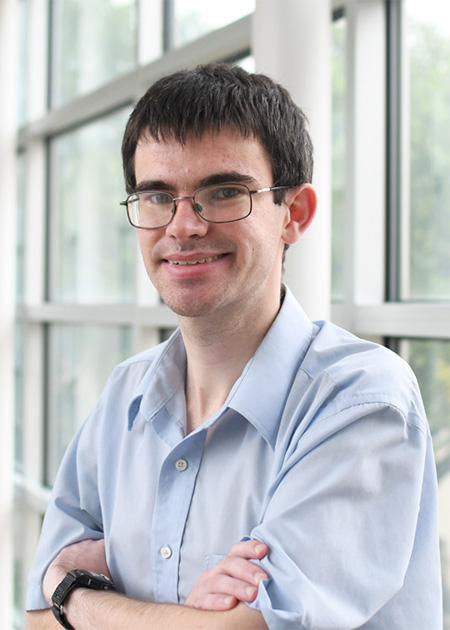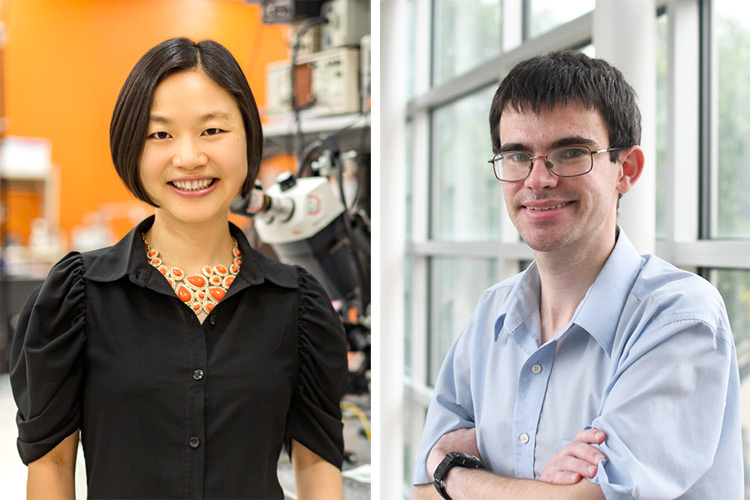Dr. Matthew Gardner and Dr. Qing Gu, both assistant professors in the Erik Jonsson School of Engineering and Computer Science at The University of Texas at Dallas, are the inaugural recipients of the Texas Instruments Early Career Award in Electrical and Computer Engineering.
In late 2019, on the occasion of UT Dallas’ 50th anniversary, Texas Instruments (TI) made a $5 million gift to create an endowment to support independent research activities of early career faculty members in the Department of Electrical and Computer Engineering (ECE) in the Jonsson School. Award recipients, designated TI Early Career Fellows, each receive $50,000 a year for up to six years.
“The TI Early Career Award recognizes Matthew’s potential and validates Qing’s early career contributions,” said Dr. Stephanie G. Adams, dean of the Jonsson School and holder of the Lars Magnus Ericsson Chair in Electrical Engineering. “We are grateful for the steadfast support that TI provides to UT Dallas and the Jonsson School.”
Dr. Peter Balyta MBA’03, TI’s vice president of academic engagement and president of its education technology division, said, “Retaining talented early career engineering faculty continues to shape UTD as a sought-after institution for engineering teaching and learning. The recipients of the early career award demonstrate UTD’s commitment to developing the strongest contributors to the electrical and computer engineering department.”
Gu joined the Jonsson School in 2016 and is an expert in nanophotonic materials and devices. The award helped recruit Gardner, who joined the Jonsson School in fall 2020 and researches electric powertrains and magnetic gears for electrified transportation and renewable energy applications.
Dr. Qing Gu

Gu currently has nearly $1.4 million in external funding, including a National Science Foundation Faculty Early Career Development Award and an award from the Department of Defense’s Army Research Office Young Investigator Program.
Her work is at the cutting edge of photonics, which uses light instead of electricity to transport data on photonic integrated circuits (IC). Innovations in this area could improve the speed and efficiency of data transfer in data centers to address the exponential increase in network traffic demands, among other applications. She is also investigating a new class of solution-processed material called perovskite for use in microchips, which has applications for bio- and chemical-sensing.
“The TI Early Career Award recognizes Matthew’s potential and validates Qing’s early career contributions. We are grateful for the steadfast support that TI provides to UT Dallas and the Jonsson School.”
Dr. Stephanie G. Adams, dean of the Erik Jonsson School of Engineering and Computer Science
“I am honored to receive this award from the Jonsson School and UT Dallas leadership that is endowed by Texas Instruments,” Gu said. “This award will enable me to investigate on-chip nanophotonic devices, in particular light sources, to construct silicon-compatible photonic ICs that can support high-speed and high-efficiency chip-scale data communication. My eventual goal is to integrate these photonic ICs with industry-leading circuits from TI, so that fast and efficient computation and data communication can be realized on the same chip.”
Gu is also an affiliated faculty member in the Department of Materials Science and Engineering and directs the Nanophotonics Lab at UT Dallas. She co-wrote the book Semiconductor Nanolasers, published by Cambridge University Press in 2017.
Dr. Matthew Gardner

Gardner is part of a $1.3 million project with Texas A&M University sponsored by the Department of Energy’s Advanced Research Projects Agency-Energy to design, fabricate and test a lightweight and efficient electric powertrain for aircraft propulsion to reduce the energy consumption and emissions from aviation. Specifically, Gardner researches reducing the size, cost and weight of electric powertrains and improving their efficiency and reliability. His work is critical for demanding applications, such as electric aircraft, but also has the possibility to affect aspects of everyday life, such as reducing the power used by washing machines.
Gardner has also developed high-efficiency designs for magnetic gears, which ultimately could replace mechanical gears for a wide range of applications, including wind turbines. He holds a patent for a novel, compact design of a magnetic gear with an electric motor. Such a design could be used for in-wheel drive for electric vehicles. Gardner also co-wrote a book chapter in the Compendium on Electromagnetic Analysis, which is published by World Scientific Publishing Co.
“I am grateful for TI’s support, which will allow me to set up the infrastructure in my lab for building a successful electric powertrains research program,” said Gardner, director of the Electric Powertrains Laboratory at UT Dallas.
“Retaining talented early career engineering faculty continues to shape UTD as a sought-after institution for engineering teaching and learning. The recipients of the early career award demonstrate UTD’s commitment to developing the strongest contributors to the electrical and computer engineering department.”
Dr. Peter Balyta MBA’03, Texas Instruments’ vice president of academic engagement and president of its education technology division
Dr. Lawrence Overzet, department head of ECE, noted that the award and initial recipients are investments in the department’s future.
“The TI Early Career Award is truly a game changer for our department and faculty,” Overzet said. “Our whole ECE community is extraordinarily appreciative to Texas Instruments for endowing these positions. The two recipients are extraordinarily strong candidates with great connections to Texas Instruments’ fields of interest and have high potential to become leaders in new and emerging research fields. It brings me great pleasure on behalf of ECE to have them receive this award.”
